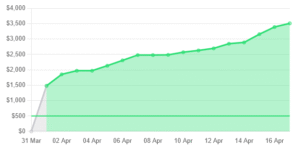I make a living writing by earning money from every available channel. That means I need to see which channels are worth my time, which I should benignly neglect, and which I should partially or completely drop. Each year since 2019, I’ve posted the results.
First, my usual caveats and exceptions.
I earn money by creating and licensing intellectual property in prose form–aka books, articles, stories, and so on. I publish globally, both independently and through publishers. I make my books available in every channel that offers acceptable terms and reject channels with unacceptable terms. I don’t seek out speaking fees, although if you put money in my hand I’ll take it and say “thank you.”
Whenever I share actual dollar figures people immediately inform me that I can’t possibly be making that much, or that I don’t deserve to make that much, or demand that I share “the secret.” The first two are not worth my time, and I’ve been shrieking the dang secret for years: keep writing with an attitude of deliberate practice, and manage your cash flow.
Nothing productive comes from such discussions, so I don’t share the numbers.
I will say that I could make far more in a tech job, but whenever I express faint interest folks offer me senior roles involving horrid words like “mentoring” and “leadership.” No thank you.
As far as actual dollar values goes, I will say: after the intoxicating heights of 2024, 2025 was a dizzying plunge. The United States is increasingly hostile to small businesses, especially ones with international customers. I make Enough.
So where did my money come from in 2025?

This chart excludes everyone under 3%. Here’s the detail.
Amazon 18.70%
Kickstarter — 21.15%
Trad Pub — 14.62%
TWP sponsorship — 14.40%
TWP ebooks — 9.43%
TWP print — 6.33%
TWP patronizer — 5.40%
Patreon — 3.85%
IngramSpark — 3.46%
Gumroad — 1.20%
Kobo — 0.46%
Apple — 0.38%
Google — 0.36%
bookshop.org — 0.14%
Draft2Digital — 0.11%
Barnes & Noble — 0.03%
I debated even including the folks at the bottom, but folks ask “what about Barnes & Noble?” so here it is. Don’t pay too much attention to the bottom: sale of a single copy can shift the lowest rankings.
This list guides many decisions. Apple Books now requires that I identify myself as a “trader” to sell books in the EU, as per the Digital Services Act. Am I going to spend the money to comply with EU laws on their platform? With Apple Books consistently being less than 1% of my income year after year? No I am not. I’d publish a big apology to my Apple readers in the EU, but I have no idea who those three people are.
The most exciting (to me) item is the brand-new “TWP print” category at 6.33%. My bookstore started selling print books in February 2025, with a printing/shipping back end provided by Bookvault. Individual print books are priced at retail, but readers pay shipping. They also get the ebook free with print. I offer a coupon code for ten percent off print books, which helps offset shipping and allows retailers to stay competitive. I also have discounts on print bundles. Last year TWP had 146 direct print orders. Over half of them were for multiple books. A few folks even bought the Total Mastery bundle in print. Shipping on the 17-book Total Mastery bundle costs about the same as shipping two books.
For decades, my readers have asked for an electronic version with the print version. I offered that and they came.
Mind you, nobody has been daft enough to buy the print version of The Full Michael.
A fair number of print orders come from Europe, even though I don’t make enough in the EU to qualify for IOSS and can’t handle VAT so readers have to pay customs on delivery. Thankfully, EU folks are accustomed to this headache when importing from backwater nations.
In past years, I’ve posted graphs showing the aggregate over time for each large channel, much like this one.

This year, I realized this is the wrong sort of graph. I want to see how my income from different channels changes over time. Here’s a more useful graph.

What can I learn from this?
First, let me define the term “retailer.” For this discussion, a retailer is a bookstore that I do not own. Amazon, Gumroad, Google, Apple, those are all retailers. Kickstarter and Tilted Windmill Press are not retailers. Kickstarter is a middleman, but they take a smaller cut than retailers.
Outside channels like retailers and Kickstarter are discovery platforms. They’re where folks learn my books exist. I need discovery platforms! But my business model gently guides people towards paying me directly. My store offers subscriptions and crowdfunding and regular book purchases much like Patreon and Kickstarter and Amazon. Whatever way folks want to pay, I’ll take their money.
I don’t want to depend on any one retailer, though, instead relying on a Redundant Array of Independent Retailers (a RAIR for you computer nerds). I want a whole mess of lines at the bottom of this graph, with a bunch of retailers each providing a relatively small percentage of my total income. If one retailer drops me, I’ll be annoyed but survive.
I want a nice healthy line at the top representing direct sales.
I want occasional spikes from Kickstarter or other third-party crowdfunding. That won’t stand out on yearly graphs, mind you, but viewed in more detail it’s definitely spikes.
In the graph above, Amazon is the dark blue line that starts near the top and drops below the pale blue Kickstarter line in recent years. The healthy crowd at the bottom is all my other channels, including a separate entry for each of my direct offerings.
But what happens if I combine the direct offerings into a single “folks who pay me directly” chunk?

That orange line that’s generally trending up year-over-year? That’s combined direct payments to me. That line represents my goal. You can see where it exceeded Amazon in 2022 and has remained above since. Kickstarter exceeded my direct income in 2024, but that was a freak event on a discovery platform. Many folks who backed Run Your Own Mail Server in 2024 went on to directly support Laserblasted and the new Networking for System Administrators. That pale blue spike in 2024 led the orange line increasing in 2025.
“But you can’t compare crowdfunding to retail sales to patronage!” Sure I can. I offer a variety of deals. People are free to choose which arrangement they want. The important thing is that I get paid to write the books I want to write.
In fact, let’s compare retail to my less expensive non-retail platforms.

Retailers take a bigger cut than non-retailers. I’m okay with deprioritizing them.
How do I feel about this? I am content but not satisfied. Income is down, but my whole nation’s economy is gasping. My bills are paid. I can withstand the loss of any one retailer. I’d like to see direct sales reach about half of my income. Trends say I’ll get there.
Not bad for a down year.
PS: Whenever I post these pieces, some folks on various writing forums declare that my business plan isn’t a “real business.” To them I’d like to say: I pay my bills writing what I want to write. I get to spend my days being creative, whether it’s discussing the moral necessity of punching billionaires in the throat, helping people reduce the agony of working in enterprise IT, or defending yourself against the tech oligarchy. The only way I could care less about getting paid per-sale versus patronage versus sponsorships would be with lobotomic assistance.
If you want to create for a living and are focused on any one style of getting paid, you are making things more difficult for yourself than necessary.








